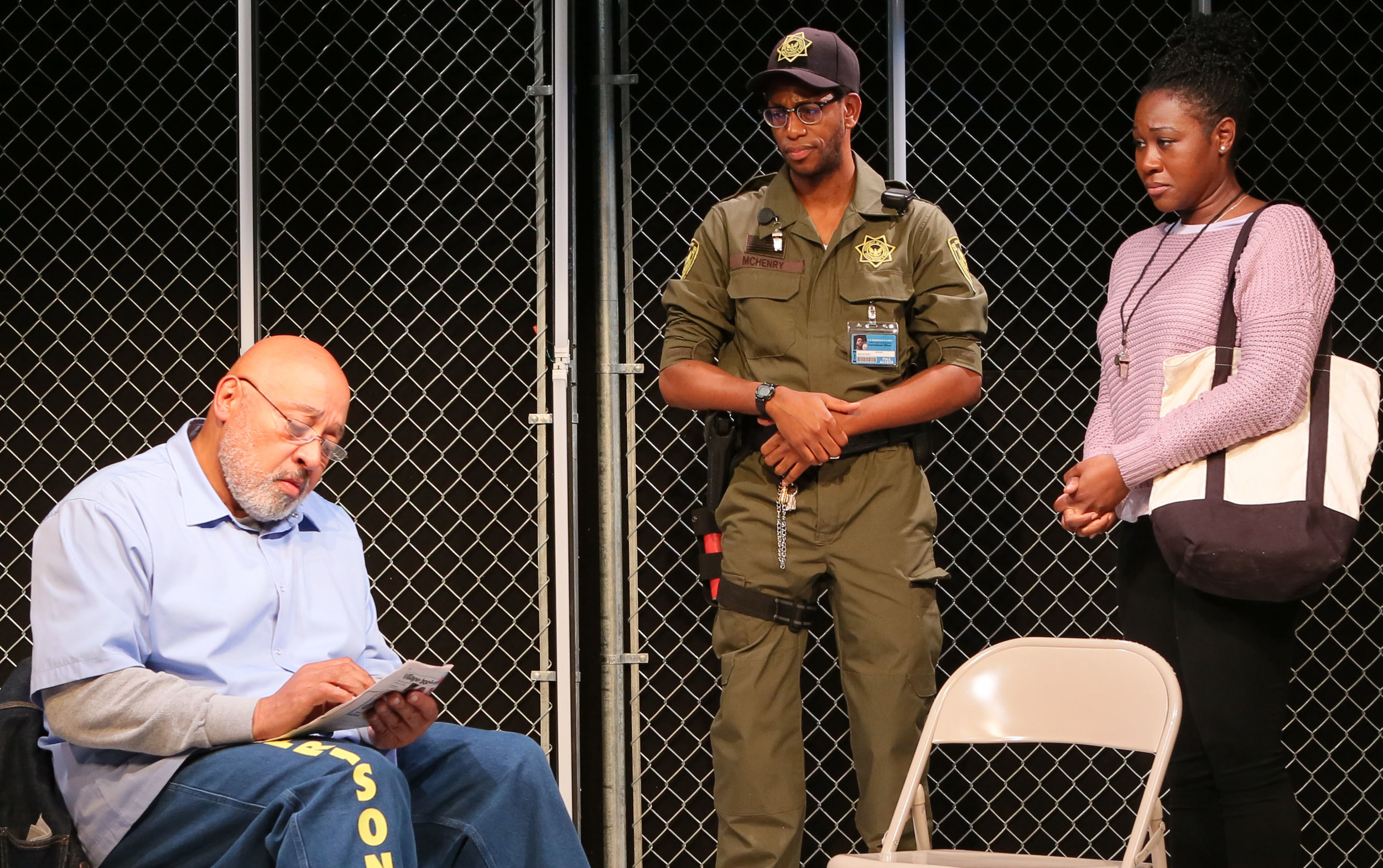The prison drama has a familiar formula: the grizzled veteran nearing parole, the hotheaded younger inmate spoiling for a fight, the wary authorities, the well-meaning outsider taking up the inmates’ cause. The difference with Cori Thomas’ Lockdown is a) it’s Rattlestick Playwrights Theater 2019, not Warner Brothers 1931, and b) it addresses contemporary, unsettling issues about incarceration, social inequity, and what awaits anybody getting out of stir. Lockdown could be described as agitprop, clearly on the side of those behind bars and not above using sentimentality to argue its points, but it’s stirring and effective, and anchored by a great performance.
That’s Keith Randolph Smith, as Wise, the inmate who’s been locked up for 46 years, since he was 16, and is readying his fourteenth plea before the parole board. Smith is one of those New York actors who’s been so good for long—Jitney, Fences, Paradise Blue, so many others—that we may have taken him for granted, and the supporting roles he’s often awarded may fail to fully show what he’s capable of. As Wise, he has a real meal, and he attacks it like it was sirloin and he didn’t care who’s looking. The perpetrator of a devastating, perhaps unforgivable crime—we don’t learn about it for a while, for Thomas’ is a striptease of a play, unveiling its revelations gradually and judiciously—he’s had time to educate himself, weigh his misdeeds, and keep up with the outside world as much as possible through the scant resources offered him.
Keith Randolph Smith’s Wise (left) submits to the extreme security measures of Eric Berryman’s commanding officer, in Lockdown. Top: Smith and Berryman with Zenzi Williams as Ernie.
Wise is curious and contemplative, a mentor who teaches a class helping younger inmates with parole pleas, though his own have gone nowhere. “Stayin’ straight don’t mean you soft,” he counsels, which registers as valid and useful instruction. Wise resists showing emotion but sometimes can’t hide it, and watching Smith, a bear of a man, react, consider, process, and assert himself is a master class. And luckily, he has an acting partner who matches him at every step.
Ernie Morris (Zenzi Williams) is the outsider, a writer whose existence has unraveled over the past few years and has volunteered to do prison work to fill up the huge space in her life that opened up when she lost her husband. She has writer’s block, and Wise, who read and loved her last book, subtly nudges her back on the path to creativity as she assists him in crafting a more effective parole statement. Ernie’s a loose cannon, as apt to break into tears as to posit a reasonable argument, and Williams lets fly with a nakedly emotional, heart-rending turn. Ernie and Wise circle each other cautiously, challenging each other’s beliefs and striving guardedly toward mutual benefit. Which we know is going to happen, but Thomas keeps us interested, throwing in some unexpected curves and keeping the dialogue terse and economical.
Berryman makes Ernie undergo some security procedures. Photographs by Sandra Coudert.
Yes, prison-drama clichés do surface. Eric Berryman, as the correctional officer who tutors Ernie in prison protocol and won’t put up with any b.s., is a tough-but-fair prototype we’ve seen before. And Clue (Curt Morlaye), the stubborn, sullen young inmate who expresses himself largely through hip-hop, is more a device than a character, and one whose ultimate fate we’d like to learn and don’t. Nor does Thomas allow us a larger view of prison life: How do Wise and Clue interact with their fellow prisoners, why isn’t Wise’s roommate (Jason Sherwood’s sparse set eventually unfurls to reveal his tiny cell) around, and what of the warden and the other officers? But the four people up on the Rattlestick’s modest stage are pretty compelling, and Kent Gash’s tightly focused direction slowly, affectingly reveals who they are.
Modern correctional facilities are largely in crisis mode—overcrowded, underfunded, and increasingly for-profit, meaning they probably don’t care about helping inmates better themselves. As Thomas pulls a heartbreaking but believable last-minute switcheroo on us, we’re left to contemplate the sad state of a system that penalizes based on race, equates harshness with justice, and mistakenly assumes that anybody behind bars is beyond reform. At the talkback (there’s one after every performance), the guest moderator, ten months out of Sing Sing and grateful for the opportunity to acquaint us with the doings of the organization Releasing Aging People in Prison, or RAPP, suggested that the audience abandon its use of reductive labels for those locked up—inmate, prisoner, criminal, etc.—and begin to think of them as just “people.” It’s a start.
Lockdown plays through May 19 at Rattlestick Playwrights Theater (224 Waverly Place, west of 7thAve.), with evening performances Tuesday through Sunday at 7 p.m. and matinees at 2 p.m. Friday and Sunday. For tickets, visit web.ovationtix.com.





